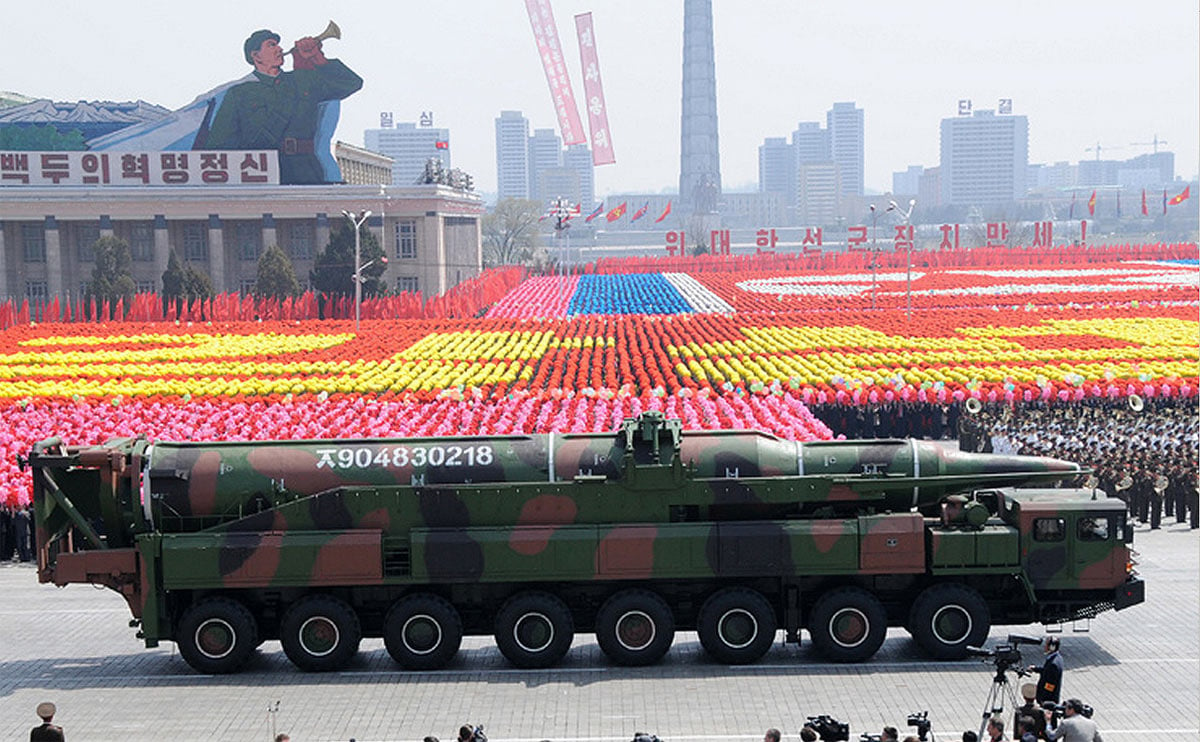
In contrast to Washington and Seoul, “Pyongyang seems curiously stable” politically, but what the ultimate goals are for its nuclear and missile development programs beyond regime survival are still unclear, four experts on Korea agreed Friday in a panel discussion at a Washington, D.C., think tank.
“It’s clear North Korea will not get rid of their nuclear weapons,” Hitoshi Tanaka, a former Japanese diplomat and chairman of the Japanese Institute for International Strategy, said. North Korea’s Kim Jong-un might use this time as governments are changing to do something dramatic — another missile or nuclear test to draw attention to itself.
Scott Snyder, a senior fellow at the Council of Foreign Relations, said the incoming Trump administration needs to “figure out how to buy time” in dealing with North Korea. He suggested continuing to strengthen deterrence capabilities on the part of the United States, Republic of Korea and Japan and strengthen defense measures across North East Asia.
Tanaka and he said it was important for the United States, Japan, South Korea, China and Russia to hold new talks among themselves on North Korea. “We need to be prepared for the worst” from Kim’s regime collapsing to Pyongyang attacking Seoul.
Deciding on “who’s doing what” whatever the case may be is critical.
Right now, the incoming administration also needs to “send a signal to China [that] North Korea is a priority for the United States,” Snyder said. “China holds the key,” Tanaka added.
Beijing has its own concerns about a possible collapse of Kim’s regime setting off troubles inside its borders with its own large Korean population and a flood of refugees. China also fears in that event an eventual reunification of the Korea putting a democratic capitalist country on its doorstep, he said.
Snyder told the audience at the Brookings institution event that the political vacuum in presidential leadership in Seoul could last for eight to 14 months, leading to more uncertainty on the peninsula. President Park Geun-hye has been impeached and ceded power to a caretaker administration.
When the new leadership comes into office, there also could be “a potential divergence” between the United States and the Republic of Korea over Seoul and Pyongyang talking directly to each other and the deployment of the Terminal High Altitude Area Defense missile system.
Sugio Takahashi, a senior fellow at the National Institute for Defense Studies, said North Korea’s ultimate intention in the two programs is “to decouple the ROK-U.S. alliance” and break the United States’ commitment to retaliate in case of an attack from the north.
At the same time, North Korea’s intention with its medium-range ballistic missile program “is to keep Japan out” of coming to Seoul’s defense with either its forces or allowing the United States to operate from the home islands to defend the Republic of Korea as it did in the Korean War or to meet the original nuclear threat that arose in the late 1990s.
He termed it North Korea’s “nuclear blackmail of Japan.” It also raises questions of what the United States would do if Pyongyang struck Tokyo first with nuclear-tipped missiles.
Another question arises over what Washington would do in case of an attack on Seoul or Tokyo if North Korea had nuclear-armed intercontinental ballistic missiles capable of reaching the United States.
Going forward, Takahashi said, “the Japanese government will need much more robust assured [and deterrence of North Korea]” from the United States to keep the security alliances viable with Japan and the Republic of Korea.
Jonathan Pollack, a senior fellow at Brookings, said if North Korea conducted nuclear test in the atmosphere that would be “truly provocative,” a step it has so far not yet taken.
Pyongyang seems to have adopted “an all azimuth strategy” that is “directed at everyone.” including China, in doubling down on its weapons and missile programs.
The regime, now in its fifth year, feels it needs external enemies to keep itself in power even as it has reduced the role of the military in its leadership. The concentration on these program “enables North Korea to punch above its weight” in threatening or dealing with other nations.
But he added, “North Korea tends to be suicidal in its language,” and “not in its actions.”
“Let’s not give credit for what it’s not done,” successfully demonstrating the ability to miniaturize nuclear weapons and fire them on ballistic missiles of any range from short to intercontinental.
After agreeing upon what each nation would do in a crisis of collapse or aggression, Tanaka said the door could be open for new negotiations with Pyongyang about its nuclear programs





